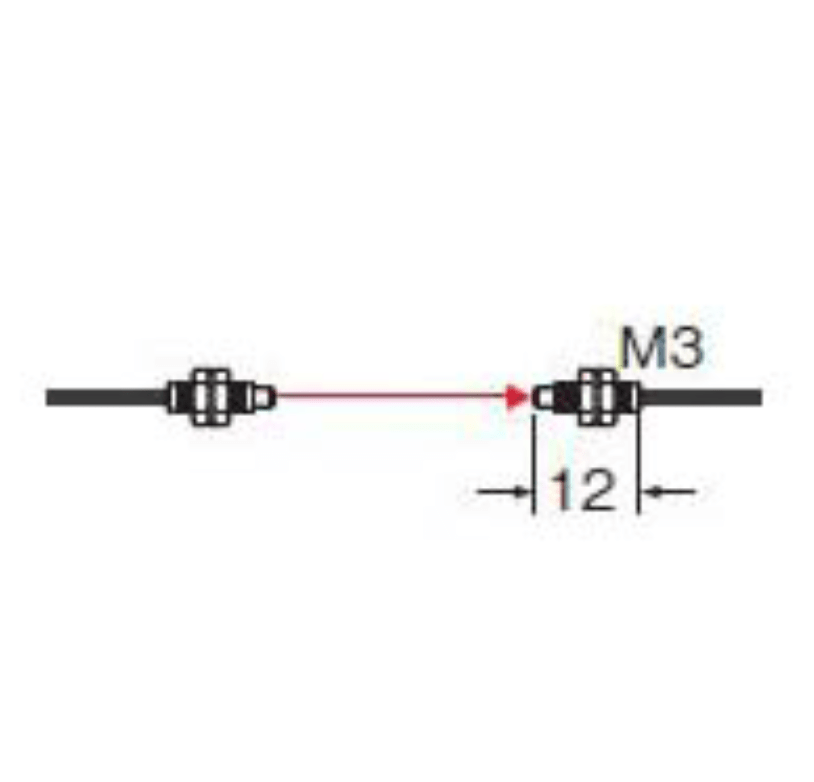Panasonic FT-31W Threaded Type Fiber: High-Precision Sensing for Industrial Automation
The Panasonic FT-31W threaded type fiber sensor is a high-sensitivity thrubeam fiber optic cable designed for industrial automation. Featuring an M3 threaded fiber design, 2m cuttable cable, and IP67 protection, the FT-31W excels in demanding applications like factory automation and material handling detection. Its small object detection capability, precision sensing technology, and industrial network compatibility make it a top choice for automation sensor solutions. With robust technical specifications, easy installation, and durable construction, the FT-31W fiber optic sensor enhances operational efficiency across various industries.
Technical Specifications of the Panasonic FT-31W Threaded Type Fiber
The FT-31W combines compact design with high precision to meet industrial demands. Below is a table of its key technical specifications:
| Parameter | Specification |
|---|---|
| Fiber Type | Thrubeam, M3 threaded |
| Cable Length | 2m, cuttable |
| Bending Radius | R1 (1 mm) |
| Protection Class | IP67 |
| Sensing Range | 315 mm (with FX-500 series) |
| Compatibility | FX-500, FX-550, FX-100 series amplifiers |
| Standards | RoHS compliant (2011/65/EU, 2015/863/EU) |
Industrial Applications and Key Features
Small Object Detection and Precision Sensing Technology
The FT-31W thrubeam fiber sensor delivers exceptional small object detection, ideal for industries like food processing, electronics assembly, and packaging. Its high-precision FT-31W fiber optic cable, enhanced by PCTC polishing technology, achieves five times greater specularity at the fiber end face, boosting light intensity for stable sensing. This precision sensing technology ensures reliable performance in high-accuracy applications.
Durability and Factory Automation
The durable FT-31W industrial fiber sensor is built to withstand harsh factory environments, thanks to its IP67 rating, which protects against dust and water. Widely used in conveyor systems and material handling detection, the FT-31W offers flexibility in moving parts due to its R1 bending radius fiber. This makes it a reliable choice for automated assembly lines and factory automation fiber applications.
Industrial Network Compatibility and System Integration
Compatible with Panasonic’s FX-500, FX-550, and FX-100 series amplifiers, the FT-31W ensures seamless industrial network compatibility. Its optical communication function enables rapid configuration of multiple amplifiers, reducing setup time. The FT-31W fiber sensor datasheet and fiber optic installation guide, available through Panasonic’s official resources, provide detailed instructions for efficient system integration, enabling businesses to streamline automation processes.
Installation and Maintenance
The FT-31W’s installation is straightforward, thanks to its M3 threaded design and 2m cuttable fiber cable. The IP67 fiber sensor operates reliably in wet or dusty environments, and the FT-31W fiber optic installation guide offers step-by-step mounting instructions. Regular maintenance, such as cleaning fiber ends, ensures long-term performance of this durable industrial fiber sensor.
Safety and Compliance
The Panasonic FT-31W threaded type fiber is RoHS compliant, adhering to EU Directives 2011/65/EU and 2015/863/EU, ensuring an environmentally friendly design. Its IP67 protection guarantees durability in challenging industrial settings. The sensor maintains stable performance under vibration or mechanical stress, making it a trusted solution for factory automation.
Why Choose the Panasonic FT-31W Threaded Type Fiber?
The Panasonic FT-31W threaded type fiber is a high-sensitivity, durable solution for industrial automation. Its compact M3 threaded fiber, 2m cuttable cable, and R1 bending radius offer flexible installation. With small object detection, material handling capabilities, and industrial network compatibility, the FT-31W optimizes production processes. The fiber sensor datasheet and installation guide simplify integration, ensuring efficiency. Choose the FT-31W to enhance automation, improve precision, and boost productivity in your operations.
Optimized Performance in Modern Automation Systems
The Panasonic FT-31W threaded type fiber sensor brings together precision engineering and long-term durability to meet the evolving demands of industrial automation. Its superior light transmission and minimal signal loss make it ideal for fast-paced production lines where consistency is critical. Designed for harsh environments, it maintains stable detection even under vibration, dust, and fluctuating temperatures, helping manufacturers minimize downtime and increase productivity.
With its M3 threaded mount and R1 bending radius, the FT-31W offers installation flexibility across automated machinery, robotic arms, and conveyor systems. The robust IP67 protection ensures reliable operation in wet or dusty areas, while the sensor’s compatibility with the FX amplifier series allows easy integration into existing setups. This combination of high accuracy and adaptability makes it a valuable tool for optimizing automation performance.
Smart Integration for Industry 4.0
The FT-31W is designed to support the transition to smart manufacturing environments. When paired with intelligent amplifier units, it enables real-time monitoring, diagnostic feedback, and predictive maintenance capabilities. These features help industries reduce energy consumption, improve process reliability, and achieve higher operational transparency. In essence, the Panasonic FT-31W threaded type fiber sensor is not just a sensing device—it’s a key component in the advancement of next-generation factory automation.

